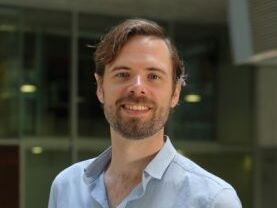Aging involves a set of physical declines that occur at different rates in different individuals, ultimately producing a wide distribution of lifespan. More than 70% of human lifespan variance cannot be explained by heritable factors, and yet the intrinsic biological mechanisms contributing to lifespan variance remain poorly understood. The group of Nicholas E. Stroustrup develops approaches to understand how changes at the molecular scale propagate through complex physiologic networks to determine the timing of organism-scale events in aging, such as death.
In his talk "Why do some individuals live longer? Unraveling the multi-scale, stochastic dynamics of aging.", he will discuss the recent progress in developing systematic methods to map organism-scale gene-regulatory networks. Measuring non-genetic variation in gene-expression within isogenic populations of C. elegans, his group discovered variation at the scale of organs, rather than individual genes, is the largest source of inter-individual heterogeneity in aging. Using this result, they identify diverse mechanisms involved in the generation and transduction of inter-individual heterogeneity not only in gene-expression but in lifespan variation as well. In particular, they identified a set of pleiotropic genes whose knockdown dramatically reduces lifespan variance—an experimental entry-point for the mechanistic study of intrinsic sources of inter-individual differences in healthy aging.
| Talk: | Why do some individuals live longer? Unraveling the multi-scale, stochastic dynamics of aging." |
| Speaker: | Nicholas Edward Strourstrup Centre for Genomic Regulation (CRG), Barcelona, Spain |
| Date: | Thursday, December 5, 2024 at 3 pm |
| Location: | Seminar room „Nucleus“, FLI 1, Beutenbergstraße 11, Jena |
| Host: | K. Lenhard Rudolph |
The seminar will take place as hybrid eventt. Access information will be shared prior to the seminar. For external guests: Please email Gundula.Bergner@~@leibniz-fli.de for details.









